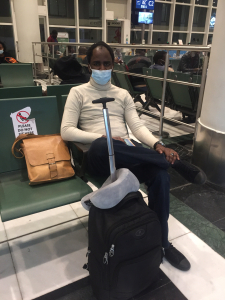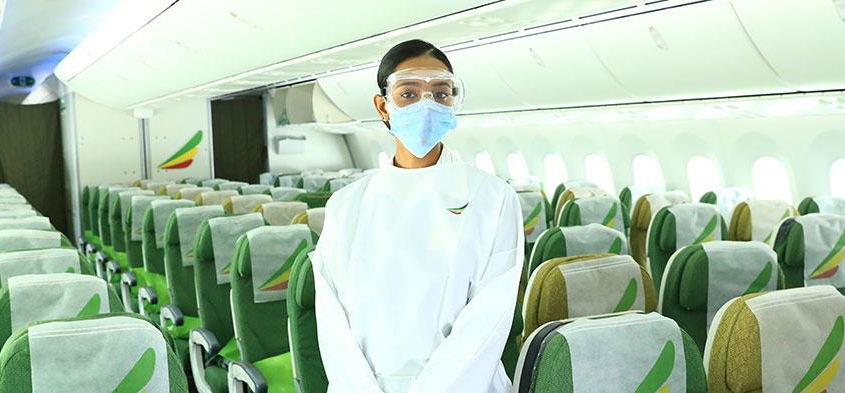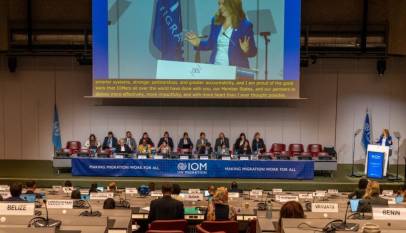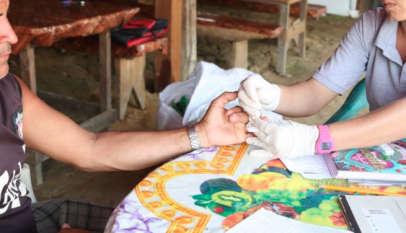TRAVELOGUE | The hurdles of traversing Africa amidst Covid-19 pandemic
Adam Alqali blogs about his personal experience traveling across the African continent during Covid-19, highlighting challenges to do with health regulations, visa problems and flight connectivity.

Africa recorded its index case of the dreaded Covid-19 disease in Cairo, Egypt, in February 2020. Although Covid-19-related fatalities on the continent were comparatively lower than in other regions of the world, the economic impact of the pandemic on Africans is as severe as in other regions, if not more so. The travel industry was one of the worst-hit sectors, as local and international travel came to a complete halt!
More than any other sector, the global airline industry felt the brunt of the pandemic’s unimaginably catastrophic impact. Even before the pandemic, travel across our continent was never an easy affair; oftentimes, flying between the capital of one country and that of its immediate neighbor could simply be nightmarish! Poor air connectivity means Africans are still being made to go via a European or Middle Eastern capital for a connecting flight to their next-door neighbor.
Compared to North and South, West Africa is a backwater for air travel. It is utterly ridiculous and incomprehensible that in the 21st century, travel between, say, Nigeria’s capital (Abuja) and next-door Niger’s capital (Niamey), which shouldn’t last for more than 1.5 hours, could take up to 24 hours or even more! I recall meeting a fellow Nigerian in 2019 at the Bole airport in Addis Ababa, returning from a summit in Niamey.
The poor fellow had flown to Addis from Niamey, spent a night there, and was flying back to Abuja that morning. The alternative to Ethiopian’s grueling Abuja-Addis-Niamey route would have been either ASKY Airlines or Air Cote’Ivoire; which is still a journey of more than 8 hours with multiple layovers.
When Nigeria recorded its index case of Covid-19 in February 2020, I was planning to travel to Stellenbosch, South Africa, for a meeting of the African Peer Review Mechanism (APRM). As fate would have it, the then-still-evolving yet fast-spreading virus and the ensuing atmosphere of confusion and uncertainty all over the world led to the complete shutdown of air travel.
It was not until September 2021 that I would travel out of Nigeria again for yet another APRM meeting in Nairobi. I arrived at the Ethiopian check-in counter at the Abuja airport on a windy Tuesday morning, armed with my passport and a negative PCR test. I was stunned when the check-in officer asked: ‘Sir, where is your visa?’ I confidently told her African citizens get their visas on arrival in Kenya, assuming she didn’t know.
When the lady insisted that I wouldn’t be checked in until I had secured my eVisa, I retorted: ‘Look, this is not the first time I am traveling to Kenya and every time I was there, I got my visa on arrival.’ Having now realized my sheer ignorance over the issue, the lady calmly explained to me that due to Covid-19, the Kenyan government was no longer issuing African citizens visas on arrival and was instead issuing eVisa which take between 24 and 72 hours to process.
I felt ashamed for assertively displaying my ignorance. This was less than three hours before my Addis-bound flight leaves, so I reached out to the APRM team in Nairobi and was asked to immediately complete the eVisa application online. With the assistance of the ever-helpful Ms Julia Mogale, I managed to complete my application but could not conclude payment with my credit card; Julia did so on my behalf.
Because I could not get my visa approved in time for my flight, Julia procured a Note Verbale for me, and with a combination of my profuse pleading, writing an undertaking, and the timely intervention of Ethiopian’s manager at the airport, I became the last passenger to be checked in on the Boeing 787-9 jet bound for Addis. My next trip in Africa would be to Durban, South Africa, in November 2021 for the 2nd Intra African Trade Fair (IATF2021).
Before Durban, I was supposed to travel to Zanzibar, Tanzania for an African Union Development Agency (AUDA-NEPAD) meeting, which I couldn’t embark upon because my passport was being held at the South African consulate in Lagos. Since I was supposed to travel to Durban straight from Zanzibar, I decided to procure an express Tanzanian eVisa at more than three times the standard cost.
Considering the length of time it takes to process a South African visa coupled with the fact that it was the end of the year, which means there were more than regular travelers from Nigeria to the country, the African Export-Import Bank (Afreximbank), promoters of the IATF, had offered to fast-track visas for delegates and exhibitors participating in the trade fair. However, the high commission in Abuja could only process our ‘fast-tracked’ visas at their consulates in Lagos and Port Harcourt.
Accordingly, on a chilly Monday morning, I took the first flight out of Kano for Lagos to begin the laborious process of submitting my application. And a process that usually takes an hour or so turned out to be more than a whole day affair, ending at around 7pm! My flight back to Kano was scheduled for 7:30pm; I missed it! I spent the night in Lagos, hoping that the South Africans would release my passport in time to allow me to travel to Zanzibar barely 10 days later.
This was not to be, as my visa was only granted a day after my Zanzibar meeting had commenced. I couldn’t travel to Zanzibar. As disappointing as that was because I had everything ready to travel, including a PCR test, I still considered myself lucky because some of the other applicants I met at the consulate in Lagos who were also traveling to IATF as delegates or exhibitors were not so lucky. They were denied visas!
On November 14, 2021, I boarded an Ethiopian flight from Abuja destined for Johannesburg via Addis from where I connected to Durban on Monday evening. I left Durban for Johannesburg in the afternoon of November 21, and on arriving at OR Tambo International, I went straight to Ethiopian’s offices to amend an error in my ticket. Actually, the travel agent had wrongly booked my departure and return cities as Accra, Ghana, instead of Abuja, Nigeria.
Although I was able to seamlessly change the departure point at Ethiopian’s counter in Abuja, I didn’t bother to change the return city because I was planning to proceed to Niamey from Durban for the AU Summit on Industrialization and Economic Diversification, which was eventually postponed at the last minute! This meant I had to come back home from Durban. To my greatest shock, I was told that although there was an available seat for me from Johannesburg to Addis, there was none on the connecting flight to Abuja from Addis. It was fully booked!
I had to change my flight out of Johannesburg to the next day, which meant I also had to redo my PCR test, as the one I had would have expired before I arrived in Abuja two days later. With the help of a concerned Ethiopian staff member, I got linked to the owner-manager of a bed and breakfast (B&B) less than 10 minutes’ drive from the airport, named German. His livelihood depends entirely on the misery of stranded passengers like myself.
By the time I arrived at the B&B in the Edenvale area of Johannesburg, it was almost 12am, and all I needed was to shower and sleep. Later, I took a cab back to O.R Tambo to inquire about PCR tests and was given two options: receiving my test results within 24 hours or paying double for an express test to be delivered in 2 hours. Since I didn’t want to take any chances, I opted for the latter; barely an hour later, my result was in my inbox.
By 11:30pm, I was seated on the plane en route to Addis; the Boeing 737-800 jet was so fully booked that for a moment I kept wondering if the pilot could lift the heavy bird off the ground. The jet eventually took off, and I happened to be seated next to a first-time flyer, an Ethiopian citizen based in South Africa. Although he has been living and working in the country for almost a decade, he travels to and from Ethiopia by road. Amazing!
When an in-flight meal was delivered, my seatmate, whose shaky English I struggled to comprehend, could not hide his disgust. He turned to me, asking if the very many passengers on board were responsible for the small package of rice and chicken we were served. I didn’t know when I burst into rapturous laughter!
Barely a month later, I returned to Durban for the inaugural retreat of APRM with the AU Peace and Security Council (PSC); thanks to my multiple-entry visa, this time around, there was no hassle. However, I came back barely three weeks after South Africa had identified the highly contagious Omicron variant of Covid-19. Although I was fully vaccinated, I carried a pocket-sized hand sanitizer all through the trip.
On the first day of the retreat, the organizers had all delegates undergo a rapid Covid-19 test before they were allowed into the meeting. I confidently had my samples taken and proceeded to the waiting room for my result. After about 20 minutes, the result came, and I was Covid-19 positive! That was one of the most astonishing pieces of news of my entire life; I simply could not believe my ears!
I was immediately asked to self-isolate in my room while sample collectors came to take my samples for a PCR test. Whereas rapid tests are much faster to produce, they are not as accurate as PCR tests, hence the decision to have me once again go through the traumatizing nasal swab test. Thank God, the open sessions of the retreat were being livestreamed, and I was able to follow proceedings.
By the early hours of the second day of the retreat, I had received my PCR test results; ironically, I was negative! Since I wasn’t displaying any symptoms, the conclusion was that my rapid test result could have been a false positive’. I left Durban on the evening of December 22 for Johannesburg, and upon arriving at OR Tambo, I immediately joined a long queue of Ethiopian’s passengers traveling out of South Africa.
After over two hours in the endless queue, it was time to get the boarding pass. Upon receiving my passport and PCR test, the check-in officer asked for my travel permit. I couldn’t hide my shock. “Which travel permit? I am a Nigerian citizen; can’t you see my passport?”
She said Nigeria’s new travel regulations require all incoming passengers to pay for their inbound Covid-19 test online before flying into the country. Due to the high number of intending passengers on that Christmas Eve, the flight was already delayed, and there was no way I could complete the process and receive my permit to travel on the same flight.
I resigned myself to my fate of spending a second unscheduled night in Johannesburg within a month. As I turned to leave the counter, as if dropped out of the sky, my eyes caught sight of German, the owner-manager of the B&B where I had stayed overnight during my November misadventure in the City of Gold. He was once again scouting for unfortunate travelers like myself.
It was already past 11:00pm, yet I tried calling Julia to break the sad news; she picked up on the first ring! Julia asked me to complete the online travel permit process while she sorted out my ticket rescheduling issue. Sadly, Ethiopian’s flights for the next two days were all fully booked. She ultimately found an Air Peace flight direct to Lagos—at a prohibitive cost, though! Julia and I remained in touch through the early hours of the day.
When my plane touched down in Lagos at dawn the day before Christmas, I could only thank God and Julia for delivering me through my most difficult travel year so far. When I got holed up in that hotel room in the city of eThekwini (Durban) because of a suspected case of Covid-19, my fears were not much about Omicron but rather the prospect of being kept in that lonely room for God knows when, at a time when everyone was celebrating the end-of-year holidays with their families.
My experience once again begs the need for African leaders to fast-track the implementation of policies related to ease of mobility for Africans within Africa, particularly the AU Free Movement Protocol (AU-FMP) and the Single Air African Transport Market (SAATM). Along with addressing transport infrastructure challenges, the two Agenda 2063 projects hold the solution to the daily hassles of Africans traveling on their beloved continent.














